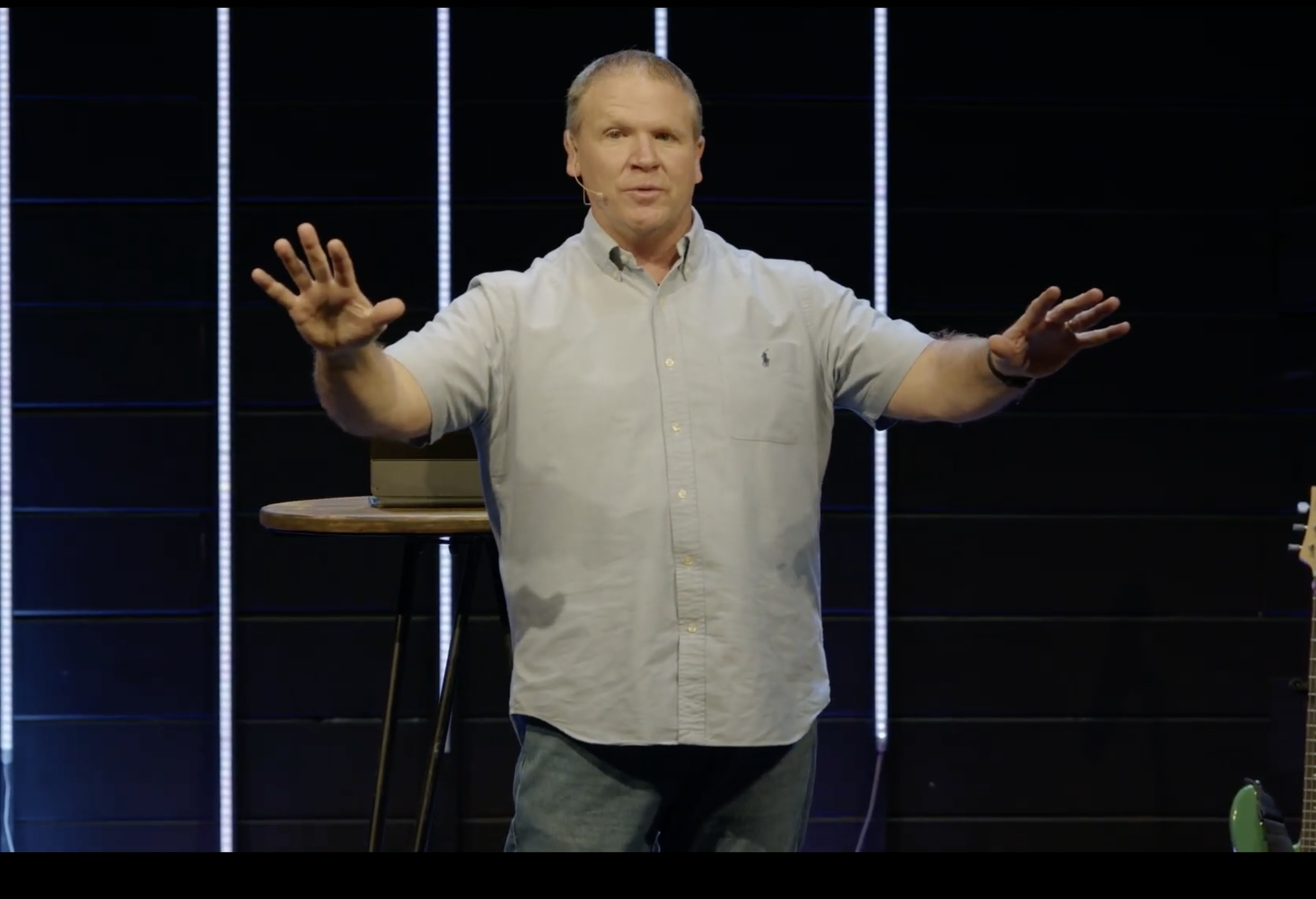How the Law and Moses point to Him
Don’t Miss the Point: The Whole Bible Points to Jesus
Devotional by Pastor Joey Rumble, Summerbrook Church
As we move from the Old Testament into the New Testament together as a church, I don’t want any of us to miss the main point: all of Scripture points to Jesus. It’s possible to read the Bible, even to study it hard, and still miss the Person it’s pointing to.
“You search the Scriptures because you think they give you eternal life. But the Scriptures point to me!” — John 5:39 (NLT)
After His resurrection, Jesus opened His disciples’ minds to see this clearly.
“Everything written about me in the Law of Moses and the Prophets and the Psalms must be fulfilled.” Then he opened their minds to understand the Scriptures. — Luke 24:44–45 (ESV)
In this devotional, I want to walk you through two big pieces of that story: Genesis and Moses—and how they point to Jesus and to your life right now.
Creation, Fall, Redemption: The Bible’s Big Story
1. Creation – You Were Created Good
The first three chapters of Genesis show the flow of the entire Bible. It starts with God’s good design.
“In the beginning, God created the heavens and the earth… And the Spirit of God was hovering over the face of the waters. And God said, ‘Let there be light,’ and there was light.” — Genesis 1:1–3 (ESV)
Father, Son, and Holy Spirit are present and active in creation. John tells us that Jesus—the Word—was there from the very beginning.
“In the beginning was the Word, and the Word was with God, and the Word was God. He was in the beginning with God. All things were made through him, and without him was not any thing made that was made.” — John 1:1–3 (ESV)
That means you were not an accident. You were created on purpose, by a loving God.
“So God created man in his own image… male and female he created them.” — Genesis 1:27 (ESV)
Every human being—born and unborn, every ethnicity, every background—bears the imago Dei, the image of God. That means you have incredible value and worth.
2. God’s Design for Gender and Marriage
Genesis doesn’t just tell us that God created us—it shows us His design. He created two genders, male and female, and He established marriage.
“Therefore a man shall leave his father and his mother and hold fast to his wife, and they shall become one flesh. And the man and his wife were both naked and were not ashamed.” — Genesis 2:24–25 (ESV)
Marriage is not a human invention. God Himself ordained marriage between one man and one woman. When we step outside of God’s design—whether in gender, sexuality, or marriage—we don’t get freedom; we get chaos. God isn’t trying to restrict us; He’s trying to bless us through His good design.
3. The Fall – Where Everything Broke
Genesis 3 shows us what went wrong. The serpent tempted Eve with a question that still echoes today: “Did God actually say…?” Doubt in God’s Word opened the door for disobedience.
“So when the woman saw that the tree was good for food… she took of its fruit and ate, and she also gave some to her husband who was with her, and he ate. Then the eyes of both were opened, and they knew that they were naked…” — Genesis 3:6–7 (ESV)
Sin brought shame, fear, and the blame game. Adam blamed Eve. Eve blamed the serpent. Sound familiar? Sin always fractures our relationship with God and with one another.
4. The First Glimpse of the Gospel
Right in the middle of the curse, God gives a promise—a red thread of hope pointing to Jesus.
“I will put enmity between you and the woman, and between your offspring and her offspring; he shall bruise your head, and you shall bruise his heel.” — Genesis 3:15 (ESV)
This is often called the protoevangelium—the first announcement of the gospel. Satan would bruise Jesus’ heel at the cross, but Jesus would crush Satan’s head with a mortal blow.
“…that through death he might destroy the one who has the power of death, that is, the devil.” — Hebrews 2:14 (ESV)
So the big story of the Bible is: Creation – Fall – Redemption. And all of it points to Jesus.
Moses: A Christlike Figure Pointing to Jesus
When we turn to Exodus and the life of Moses, we see another powerful picture of Jesus. Moses isn’t the Savior, but his life is a huge signpost pointing to the true Savior.
- Moses was brought out of Egypt; Jesus was called out of Egypt.
- Moses was a shepherd; Jesus is the Good Shepherd.
- Moses did miracles to prove he was God’s prophet; Jesus did greater miracles to show He is the Prophet and the Son of God.
- Moses led God’s people through the Red Sea; Jesus leads us through the “waters” of the Holy Spirit and new birth.
- Moses pulled Israel out of slavery to Egypt; Jesus pulls us out of slavery to sin.
- Moses gave the old covenant; Jesus brings the new covenant.
- Moses had them sacrifice a lamb so death would pass over; Jesus is the Lamb of God who takes away the sin of the world.
- Moses interceded for the people; Jesus ever lives to intercede for us.
Moses even prophesied that a greater Prophet was coming.
“The Lord your God will raise up for you a prophet like me from among you, from your brothers— it is to him you shall listen.” — Deuteronomy 18:15 (ESV)
That “prophet like me” is Jesus. The law God gave through Moses was good, but it couldn’t save us—it could only show us our sin.
“For by works of the law no human being will be justified in his sight, since through the law comes knowledge of sin.” — Romans 3:20 (ESV)
That’s why we needed Jesus to come, to rescue us from darkness and bring us into His kingdom.
“He has delivered us from the domain of darkness and transferred us to the kingdom of his beloved Son.” — Colossians 1:13 (ESV)
Relationship Before Rules
I love what God says right before He gives the Ten Commandments. He doesn’t start with rules—He starts with a reminder of relationship and rescue.
“I am the Lord your God, who brought you out of the land of Egypt, out of the house of slavery.” — Exodus 20:1–2 (ESV)
God didn’t say, “Keep my law and then I’ll save you.” He saved them first, then gave them the law. Relationship before rules.
The first four commandments are about our relationship with God—no other gods, no idols, honoring His name, keeping His day holy. The last six are about our relationship with people.
“Honor your father and your mother, that your days may be long in the land that the Lord your God is giving you.” — Exodus 20:12 (ESV)
Jesus later summed all of this up in two commands:
“You shall love the Lord your God with all your heart and with all your soul and with all your mind. This is the great and first commandment. And a second is like it: You shall love your neighbor as yourself. On these two commandments depend all the Law and the Prophets.” — Matthew 22:37–40 (ESV)
Don’t miss this: Jesus didn’t come just to give you better rules. He came to restore your relationship with a holy God, and then from that relationship, empower you to love people well.
Restored to God, Restorers of Relationships
In Genesis, we see broken relationships everywhere—between humanity and God, and between people. But Jesus came to restore what was broken.
When you receive Christ, your sins are fully paid for at the cross. Yet here on earth, you still wrestle with that old sinful nature. The good news is: God is at work in you, transforming you from the inside out.
“If possible, so far as it depends on you, live peaceably with all.” — Romans 12:18 (ESV)
Because Jesus has healed your relationship with God, you can now be a relationship restorer in your home, your workplace, your friendships, and your church—as far as it depends on you.
Jesus even said:
“I tell you, something greater than the temple is here.” — Matthew 12:6 (ESV)
The temple was the center of worship and sacrifice in the Old Testament. But Jesus says, “I’m greater than all of that. I’m the One it was all pointing to.”
Enjoying the Journey with Jesus
God doesn’t just want you to “check the box” spiritually. He wants a close, daily friendship with you.
One of the ways we’re pursuing that as a church is through the Harmony of the Gospels reading plan and our SOAP (Scripture, Observation, Application, Prayer) journals. When you open your Bible, don’t just rush through. Pray: “Lord, I want to know You. Open my mind to understand the Scriptures.”
Richard Foster describes a rhythm of desire, discipline, delight. At first, it takes discipline to get in the Word and push past distractions. But as you keep showing up, time with God turns into delight: “Lord, I get to be with You today.”
My prayer for you this season is that you wouldn’t just know about God, but that you would walk in a fresh, enjoyable friendship with Him— out of which flows grace, peace, and restored relationships with others.
Don’t Miss the Point
From Genesis to Moses, from the Law to the Prophets, from the Psalms to the Gospels, the red thread is the same: Jesus came to restore your relationship with a holy God and to make you a healer of relationships in a broken world.
Maybe you’ve been hanging on to sin, bitterness, or a hardened heart. Maybe your relationship with God has grown distant—and that’s spilling over into your relationships with others. Today is a great day to repent, to return, and to receive fresh grace.
A Prayer to Respond
If you’ve never surrendered your life to Jesus—or if you need to come back to Him—pray this from your heart:
Lord Jesus,
I confess with my mouth that You are Lord,
and I believe in my heart that God raised You from the dead ( Romans 10:9–10).
I repent of my sin. I turn from going my own way.
Thank You for dying on the cross in my place,
for crushing the power of sin, death, and the devil.
Restore my relationship with You, God.
Fill me with Your Holy Spirit.
Help me to walk in obedience out of love, not just duty.
And make me a restorer of relationships around me,
as far as it depends on me.
From this day forward, I choose to follow You.
In Jesus’ name, amen.
If you prayed that prayer, tell someone, get planted in a local church family, and keep walking with Jesus in His Word. Don’t miss the point—the Scriptures point to Him, and He loves you more than you know.
-DSB,
Joey Rumble

